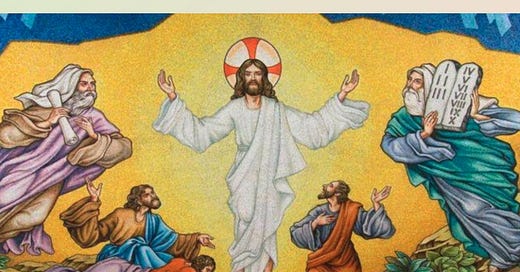Gen 22:1-2,9a,10-13, 15-18; Rom 8:31b-34; Mark 9:2-10
Today's first reading contains a shocking command: "Take your son Isaac, your only one, whom you love, and go to the land of Moriah. There you shall offer him up as a holocaust on a height that I will point out to you" (Gen. 22:2). Throughout the entire Scriptures, God never asks anyone else to do such a thing. Moreover, one of the many sins that led to the fall of Jerusalem in 586 BC was the terrible sin of sacrificing “their sons and daughter” to Baal - a pagan local deity, something that God “never commanded or considered” (Jer. 7:31; 19:5-6). What's going on here?
Catechism helps us understand the true meaning of the first reading. By being ready to sacrifice his only and beloved son, "the father of the believers [Abraham] has become like the Father who will not spare his own Son [also the only and beloved] but will give Him up for us all" (CCC 2572). The first reading is a prophecy fulfilled in Jesus Christ. The sacrifice of Jesus on the hill of Golgotha is the greatest manifestation of God's love for each one of us. "Behold, the Lamb of God" and a ram replaced Isaac in today's story.
When Jesus mentioned his death on the cross for the first time, Peter publicly rebuked him. This reaction was and remains a manifestation of human thinking that does not understand God's plans (Mark 8:32-33). Therefore, today, the Father from heaven commands us to obey His beloved Son (Mark 9:7). This obedience refers to accepting the truth that there is no resurrection without the cross. "Amen, amen, I say to you, unless a grain of wheat falls to the ground and dies, it remains just a grain of wheat; but if it dies, it produces much fruit"(John 12:24). "Life comes only through death, through loss of self" (Benedict XVI).
“If God is for us, who can be against us? "(Rom. 8:31). These words were written by someone who sacrificed his life for the sake of the Gospel. Although the whole world may be against us, it does not matter. Jesus has revealed to us the mystery of life after this life: "And he was transfigured before them, and his clothes became dazzling white, such as no fuller on earth could bleach them. Then Elijah appeared to them along with Moses, and they were conversing with Jesus"(Mark 9:3-4). How good it is to be there, yet we cannot remain. Coming down from the Mount of Transfiguration the disciples were wondering "what rising from the dead meant" (Mark 9:10). They will find the answer on Easter morning: “Christ Jesus it is who died - or, rather, was raised - who also is at the right hand of God, who indeed intercedes for us” (Rom 8:34).
According to the letter to the Hebrews, Abraham was able to pass today’s test because of his faith that “God was able to raise even from the dead” (Heb 11:19). Our Lord was able to endure the cross, “for the sake of the joy that lay before Him” (Heb. 12:2). Apostle Paul from prison wrote about his intense desire to be with Christ (Phil. 1:23). As we are coming down today from the Mount of Transfiguration to face the scandal of the Cross let us never lose sight of what lies ahead of us: “I shall walk before the Lord, in the land of the living” (Ps. 116:9).




